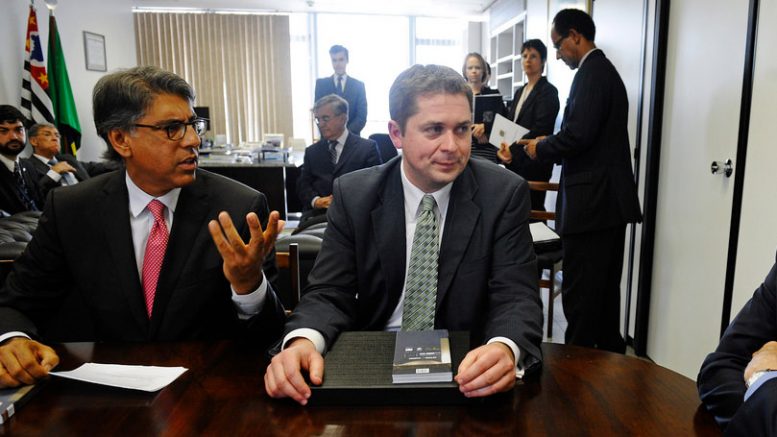Sunny ways don’t pay the bills,” quipped a rosy-faced Andrew Scheer after he won the leadership of the Conservative Party of Canada by a hair in May. Maybe not Mr. Scheer, but they sure have made Justin Trudeau’s Liberal government popular.
According to an online poll conducted by Abacus Data during July, the Trudeau Liberals would receive the support of 43 per cent of Canadians aged 18 and over were an election held today, while only 31 per cent said they support the Conservatives. The NDP fell to a dismal 16 per cent of support Canada-wide, but I will save that sob story for another day.
This is obviously good news for the ruling Liberals. Just over halfway through their first mandate, they can celebrate higher popularity then when they were elected with a large majority in October 2015, representing the support of 40 per cent of voters.
Reading the poll’s results, however, the Liberals’ comfortable popularity was less surprising than the Conservatives’ uncomfortable unpopularity at a time when the latter should have been – by their accounts – gaining support.
Abacus’ online poll surveyed 2,036 Canadians between July 14-18, just days after news broke that the Trudeau government had reached a $10.5 million settlement with Omar Khadr and apologized to the former Guantanamo Bay prisoner. That move has continued to elicit scorn from right-leaning Canadians and vocal opposition from the Conservative caucus in Ottawa.
Conservative MPs quickly took to the airwaves and column pages to voice their intense disapproval with the decision, including Calgary Conservative MP Michelle Rempel, who went so far as to make an appearance on Fox News for the sake of shaming the government.
“Most Canadians, I think, are quite outraged and quite disappointed by this state of affairs,” Rempel told Fox News political commentator Tucker Carlson, seated in front of a graphic of Khadr that read “Terrorist Payday.”
Rempel was at least somewhat correct when she told Carlson’s audience that most Canadians are disappointed in the Khadr decision. The same Abacus poll found that 55 per cent of Canadians think the Liberals did “a poor job” with their approach to the Khadr settlement. That being said, “are you outraged by this state of affairs?” is not a question pollsters ask in political surveys.
However, if the Conservatives hoped this strong show of discontent would bolster right-leaning support, or at least chip away at Trudeau’s popularity, they are wrong. The data has spoken and most Canadians are simply not buying into the right’s ploy to stir up American-style populist anger toward the Liberals on this issue. If the Conservatives won’t take heed of these poll results, they should at least work on making the opposition benches comfy, as they will be spending another election cycle there.
Harper-style fear tactics – like making a fuss over women in niqabs taking the citizenship oath, or introducing a “barbaric practices hotline” – flat out failed to produce returns at the ballot box in 2015. Canadians chose to elect a party and leader who rejected those ideas out-front.
More recently, former Conservative leadership candidate Kellie Leitch ’s proposed so-called Canadian values test for immigrants flopped massively, garnering the Ontario MP a paltry eight per cent of Conservative votes in a doomed bid to helm the party – even after she doubled down on the divisive notion.
Ignoring all the tell-tale signs, the Conservatives continue with the practice of scorn and anger, as seen through their acidic reaction to the Khadr settlement. It’s just not working.
To boot, Andrew Scheer – who takes no offence to being labeled “Harper with a smile” – has a popularity of only 20 per cent Canada-wide, according to the Abacus poll. His disapproval rating is 22 per cent, which means that 58 per cent of respondents, when asked about Scheer, at best responded: “Andrew who?” At worst, 58 per cent of respondents know exactly who he is and do not support him.
The Tories need to start putting a progressive foot forward and work on delivering a clear message to Canadian voters as the 2019 election approaches. The federal NDP is about to elect its new leader in the fall, and once that happens, both opposition parties are going to have to be laser-focused on defeating the high-flying Liberals.
It’s time for a rebrand among the Conservative ranks.
Scheer did well to name one of his former leadership opponents, Lisa Raitt, as deputy leader of the party. Raitt, who is as progressive as a conservative can be on social issues, has her work cut out for her in selling the Conservative brand to a modern and increasingly socially liberal Canada.
The new Conservative leader also made the right choice in keeping Brad Trost – a Tory so socially conservative it made one feel they were watching a leadership race from the 1950s every time he spoke – out of his shadow cabinet. Scheer, who is socially conservative himself, must ensure that people like Raitt drown out voices like Trost’s in the ongoing struggle for popular support.
Merely choosing a good team, however, is not nearly enough if the Conservatives want to be viewed as a viable alternative to the Liberals in a couple years’ time. They need to start selling a positive conservative vision for the country to win over Canadians, and to stop relying on childish fits whenever Trudeau does something they don’t like as a main electoral strategy.
Unless the Conservatives widen their tent and begin to preach more progressive values to Canadians, they will be doomed to suffer the same fate in 2019 as they did in 2015.
That, more than anything, will be their new rosy-faced leader’s test in the months to come.


